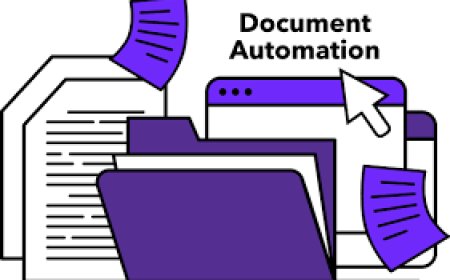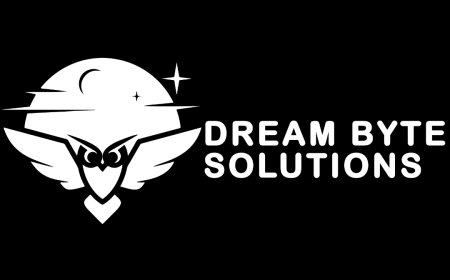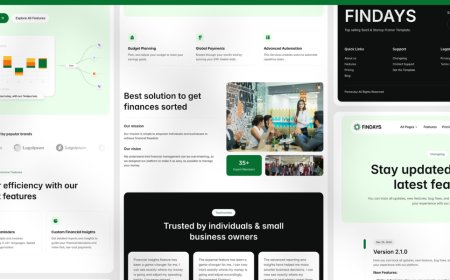What’s in an IT Support Package? A Guide for UK Companies
Explore key features, expert roles, and pricing insights to help choose the best IT support package for your company’s evolving technology needs.
In todays fast-paced digital world, having the right IT support is not just an option it's a necessity. Whether youre a small business managing daily tasks or a growing company handling complex operations, reliable IT systems are essential. But with the rise of cloud technology, cybersecurity threats, and remote working, how do you ensure your IT is covered? The answer lies in having a solid IT support package.
In this guide, well walk you through whats included in an IT support package, the role of an IT solution architect, and how to understand outsourced IT support costs all tailored for UK companies looking to make smart, cost-effective decisions.
What Is an IT Support Package?
An IT support package is a service agreement that provides businesses with a range of technology services to keep their systems running smoothly. Think of it as your tech safety net ensuring that when something goes wrong, help is just a call or click away.
But beyond fixing problems, modern IT support is designed to prevent issues before they happen. Thats why many businesses in the UK are moving from traditional break-fix models to managed IT support. This means youre not only fixing faults but also benefiting from proactive monitoring, updates, and expert guidance.
Whether you choose in-house support or partner with a third-party provider, an IT support package is the backbone of business continuity in the digital age.
Whats Typically Included in an IT Support Package?
A comprehensive IT support package will often include the following services:
1. Helpdesk Support
This is the frontline of your IT package. When staff have trouble with emails, applications, or devices, they can contact the helpdesk for immediate remote assistance.
2. On-Site Engineer Visits
For issues that cant be resolved remotely such as hardware failures or network problems a technician can be sent to your workplace. This is especially useful for companies relying on physical servers or networked printers.
3. 24/7 System Monitoring
Constant monitoring helps detect issues like server downtime, storage overuse, or suspicious network activity. Early detection often prevents bigger problems and downtime.
4. Patch Management
Software needs regular updates to fix bugs and protect against cyber threats. Your IT support provider ensures that all systems and software stay updated automatically.
5. Cybersecurity Protection
A strong IT support package includes firewalls, anti-virus software, spam filters, and real-time threat detection. As cyber attacks grow more sophisticated, layered protection is critical.
6. Data Backup and Disaster Recovery
Backing up your data daily and being able to restore it quickly is crucial. If your systems are compromised, damaged, or deleted, backup services ensure minimal disruption.
7. Cloud Services Support
Many UK businesses use cloud platforms like Microsoft 365 or Google Workspace. Your support package may include user account setup, cloud storage configuration, and app troubleshooting.
8. Procurement and Licensing Advice
IT providers can help you choose and purchase the right software or hardware, often at better rates. Theyll also manage licences so you stay compliant and avoid overspending.
The Role of an IT Solution Architect
A key element that sets apart basic IT support from advanced support is the presence of an IT solution architect. But who are they, and what do they do?
AnIT solution architectis a senior-level professional responsible for designing and implementing technology systems that align with your business goals. They dont just fix problems they prevent them by building scalable, secure, and cost-effective IT environments.
For example, if your business is expanding and needs to move to the cloud, an IT solution architect can design the right infrastructure to ensure a smooth transition. They consider everything from system compatibility and data security to user access and future scalability.
Moreover, they tailor IT support packages to fit your specific industry requirements. Whether youre in finance, legal, retail, or healthcare, a solution architect ensures your tech supports your day-to-day operations without unnecessary complexity or cost.
In-House vs Outsourced IT Support: What Works Best?
One of the biggest decisions UK businesses face is whether to build an internal IT team or outsource support to a third-party provider. Each approach has its pros and cons.
In-House Support:
- Greater control over systems
- Faster physical response time
- Better alignment with company culture
However, maintaining an in-house team can be costly, especially when factoring in salaries, training, software, and time off.
Outsourced IT Support:
- Lower and more predictable costs
- Access to a broader skill set, including experts like IT solution architects
- Scalable services as your business grows
- No recruitment or HR issues
For most SMEs in the UK, outsourced IT support offers the best balance between cost and service quality. Many providers even offer hybrid models combining internal and external teams for maximum flexibility.
Understanding Outsourced IT Support Costs in the UK
Lets talk about money. One of the first questions business owners ask is: How much does outsourced IT support cost?
Outsourced IT support costscan vary based on several factors:
Pricing Models:
- Per User or Device:You pay a fixed monthly fee per user or device.
- Tiered Packages:Different service levels (e.g. Basic, Standard, Premium) depending on the complexity of your needs.
- Hourly or Project-Based:Ideal for short-term needs or one-off consultancy work.
Typical UK Cost Range:
- Small businesses might pay around 2060 per user/month for standard support.
- Larger businesses with advanced needs could pay 80120+ per user/month.
- Hourly support for ad-hoc work might range from 60120 per hour.
Disclaimer: The above costs are typical estimates and can vary based on your business size, specific needs, and service provider. Always request a tailored quote for accurate pricing.
What Affects the Price?
- Number of users and devices
- Need for 24/7 support
- Cybersecurity and backup services
- Cloud infrastructure complexity
- On-site visits or remote-only support
While cost is important, its essential to consider value. A strong IT support provider prevents downtime, secures your data, and helps your business grow confidently. Thats a solid return on investment.
Choosing the Right IT Support Provider
Not all IT providers are equal. Choosing the right one can save you time, money, and stress.
What to Look For:
- Proven track record and industry experience
- Services aligned with your specific business goals
- Clear SLAs (Service Level Agreements) with guaranteed response times
- Transparent pricing no hidden fees
- Strong customer reviews and case studies
Its a good idea to schedule a consultation call. This allows you to explain your challenges and goals while the provider outlines how they can support you. The best providers will also offer a technology audit to review your existing setup and identify areas of improvement.
Conclusion
Choosing the right IT support package can be the difference between daily disruptions and smooth business operations. By understanding whats included, the importance of an IT solution architect, and how outsourced IT support costs are structured, UK businesses can make informed choices that benefit both their budgets and their long-term success.
Whether youre a startup or an established company, the right support package offers peace of mind, improved productivity, and future-ready systems.
For expert guidance on IT support tailored to your business, trust the team at Renaissance Computer Services Limited helping UK companies grow with reliable, cost-effective IT solutions.








&srotate=0)

























